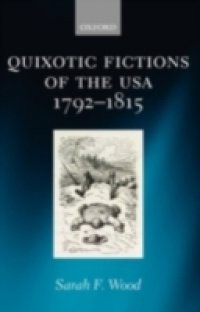Quixotic Fictions of the USA 1792-1815 explores the conflicted and conflicting interpretations of Don Quixote available to and deployed by disenchanted writers of America's new republic. It argues that the legacy of Don Quixote provided an ambiguous cultural icon and ironic narrative stance that enabled authors to critique with impunity the ideological fictions shoring up their fractured republic. Close readings of works such as ModernChivalry, Female Quixotism, and The Algerine Captive reveal that the fiction from this period repeatedly engaged with Cervantes's narrative in order to test competing interpretations of republicanism, to interrogate the new republic's multivalent crises of authority, and to question both the possibility and the desirability of anisolationist USA and an autonomous 'American' literature. Sarah Wood's study is the first book-length publication to examine the role of Don Quixote in early American literature. Exploring the extent to which the literary culture of North America was shaped by a diverse range of influences, it addresses an issue of growing concern to scholars of American history and literature. Quixotic Fictions reaffirms the global reach of Cervantes's influence and explores the complex, contradictory ways in which Don Quixote helped shapeAmerican fiction at a formative moment in its development.

